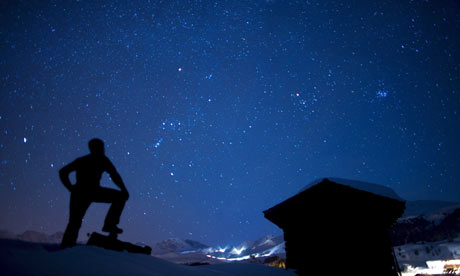
One of the great joys of this time of year in these northern latitudes is what we in Ireland refer to as "a great stretch in the day". We seem to take great comfort seeing daylight reclaim those hours, early and late, that have for some time now belonged to night.
Night. In spite of everything, we are still, as a species, uncomfortable with it. We have, from earliest times, invested much of our technological effort into artificially dispelling the darkness, to the extent that those of us who live in cities never really experience its full depths any more. And still we seem to fear it.
One reason for this fear is expressed in Lorine Niedecker's "What horror to awake at night". The poem relates an experience that most of us may have had from time to time; sleep deserts you and you are alone in the dark with nothing but your own failures and faults. In Niedecker's case, the outcome is a stark realisation that "I've spent my life on nothing".
Matthew Arnold was another poet for whom the wakening night held horrors, at least if the evidence of "Dover Beach" is anything to go by. Despite the initial sweetness of the night air and the invitation to share it with the poet, the resolution of the piece is down where "ignorant armies clash by night". Arnold, who placed so much value on culture, seems to see night as being the site and symbol of the anarchy he so dreaded.
Great as our dread of facing the night awake may be, it is nothing to our fear of sleep and the dreams it brings. Perhaps this fear has its roots, as Anne Stevenson seems to be saying in "The Enigma", in the way dreams can force us to confront our inability to understand the world we inhabit and our inadequacy and unpreparedness in the face of that greater sleep that awaits us all.
Personally, I don't share these gloomy views of the nocturnal world. I'm inclined to think, with Anne Sexton, that there are few things more glorious than a "Starry Night" and, with Charles Reznikoff, I'm quite happy to sit in the moonlight and simply look at the world while time loses all meaning.
Perhaps if we could follow Robert Louis Stevenson's example and revel in the mysteries of "Windy Nights", our fears would be dispelled? Or maybe we need to remind ourselves more often that night is the time for love, and that the longer and darker it is, the more opportunities there are for lovers' assignations of the type celebrated in Herrick's "The Night Piece, to Julia" and Robert Browning's "Meeting at Night". Of course, we should never forget that even as inveterate a lover as Byron recognised that even love must rest and lovers reach an age when they go no more a-roving.
Rest, sleep, a refreshing of body and mind: these are night's greatest gifts to us and are reason enough to welcome its arrival each day. But before you drift off, this week's challenge is to share your poetic night pieces with us. Whether you fear or delight in the hours of darkness, your night poems are wanted here.

